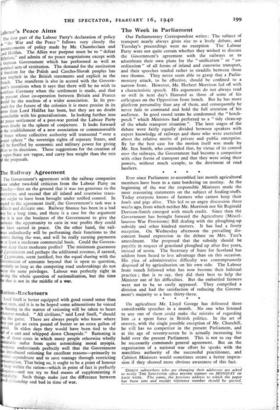abour's Peace Aims
The first part of the Labour Party's declaration of policy " the War and the Peace " follows very closely the ouncements of policy made by Mr. Chamberlain and d Halifax. The Allies war purpose must be to " defeat Verism," and admits of no peace negotiations except with German Government which has performed as well as wised acts of restitution. The demand for the restitution freedom for the Polish and Czecho-Slovak peoples has implicit in the British statements and explicit in the ench. The manifesto is also in accord with the Govern- ent's intentions when it says that there will be no wish to umiliate Germany when the settlement is made, and that present close co-operation between Britain and France ould be the nucleus of a wider association. In its pro- ls for the future of the colonies it is more precise in its s than Lord Halifax has been, but they are no doubt oncilable with his generalisations. In looking further into e peace settlement of a post-war period the Labour Party oves freely in the sphere of conjecture. It looks forward the establishment of a new association or commonwealth States whose collective authority will transcend " over a roper sphere " the sovereign rights of separate States, and be fortified by economic and military power for giving ect to its decisions. These suggestions for the creation of super-State are vague, and carry less weight than the rest the proposals.






































 Previous page
Previous page